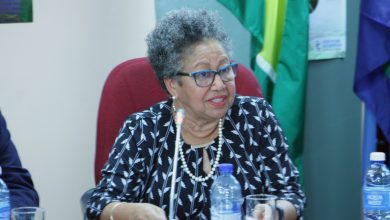(CARICOM Secretariat, Turkeyen, Greater Georgetown, Guyana) The critical importance of tourism to the Caribbean Region coupled with the sector’s vulnerability to the negative impacts of major global crises necessitated that the Region intensified its quest for development finance to support the industry.
This view was expressed by Ambassador Lolita Applewhaite, CARICOM Secretary-General (ag) at the opening of the Annual Caribbean Tourism Summit in Brussels, Belgium on 14 March 2011.
Ambassador Applewhaite pointed out that the Summit was taking place at a time when societies and economies in the Region had not yet recovered from the global economic and financial crises to which their vulnerable economies had been exposed over the past three years. Natural and man-made developments exacerbated current challenges to recovery, she added.
Against that backdrop, Ambassador Applewhaite said that Caribbean Forum of African and Pacific States (CARIFORUM) anticipated that the Summit will result in “closer and sustained policy dialogue on tourism and related tourism development issues with Member States of the European Union, the European Parliament and the European Commission and begin a process that will give tourism a greater focus in future Caribbean-EU relations.”
The dialogue, Ambassador Applewhaite said, provided a “unique opportunity for the Caribbean to exchange views with its most important development partner on policy issues related to Caribbean tourism, including aviation taxation, the impact of crime, the need to increase airlift, training and research, public health, foreign direct investment in the industry and CARIFORUM-EU cooperation in tourism within the context of the CARIFORUM-EU Economic Partnership Agreement (EPA).”
It was crucial given that tourism was one of the major economic development drivers providing investment, employment and foreign exchange earnings for most of the members of the Caribbean Community, the Acting Secretary-General said.
She added that while most of CARICOM countries had experienced a deficit in trade in goods, it was offset by a surplus in trade in services, fuelled mainly by receipts from tourism and travel-related activities.
Enumerating the specific figures which revealed the Region’s dependence on tourism, Ambassador Applewhaite explained that during 2008-2009, for example, the deficit in trade in goods averaged 3.1 billion Euros. In that same period, the surplus generated from tourism and travel related activities averaged 2.5 billion Euros.
In the wider context, she related that the industry accounted for 12.8 per cent of the Caribbean’s GDP, making it the most tourism-dependent region in the world.
Ambassador Applewhaite pointed out that this dependence puts the Region in a precarious position, as major global upheavals inevitably impacted on tourist arrivals.
“The initial turnaround of the tourism sector after the ripple effect of the global economic and financial crisis could now be threatened by the current volatility of oil prices, spawned by the unrest in the Middle East.”
“These upheavals, which ultimately drive up the cost of travel, threaten the very existence of our tourism-based economies, since many other fuel-based operating costs will also be increased,” she said.
Notwithstanding, the Secretary-General stated that the opportunities the sector offered were multifaceted, from the capacity to address unemployment to rural poverty reduction through sport, culture and heritage tourism.






